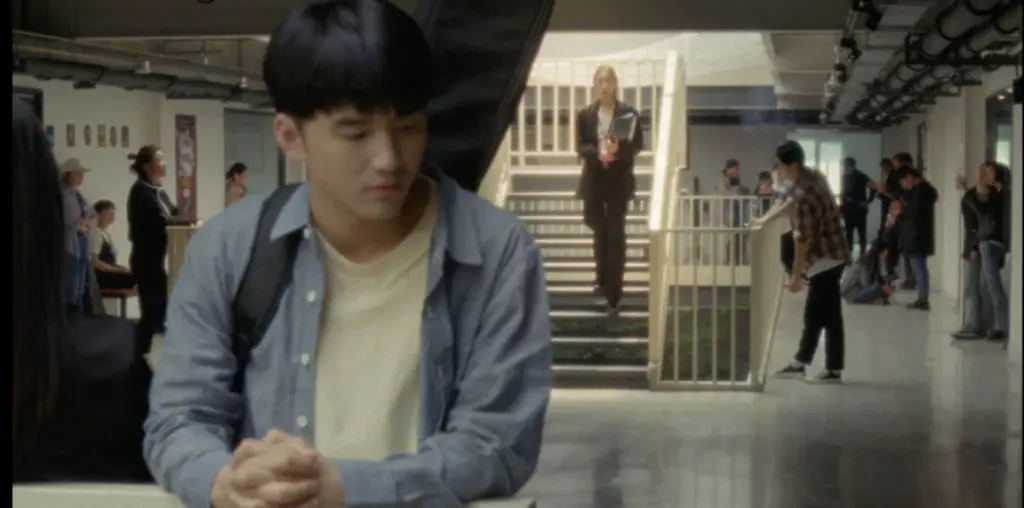
With three documentaries in the can (Aftermath: The Remnants of War; “Shipbreakers”; Bruce and Me) and another (“A Whale of Tale”) in final edit, it seemed an excellent time to have a conversation with the man who has, in various ways, been involved in all of these projects. Two weeks prior to the 2004 version of the Toronto International Film Festival, James Wegg caught up with Ed Barreveld in the Portuguese section of Dundas Street West.
All of your films have a strong international element. How did your find your way from Holland to Canada? ^ Holland in the ‘80s seemed a dead-end to me. I felt disenfranchised from the mainstream so I dropped out of high school and took a chance on something better in Ottawa. I worked in administrative positions for a few years in the era when there was a big push by the government to increase bilingual employees. I ended up in Toronto, taking a staff position with the National Film Board and soon wished I’d made that move three years sooner.
Had you already had some background with filmmaking? ^ Not a lot. When I was younger, I thought I’d take a crack at being a jazz musician. It didn’t take long before realizing that I wasn’t going to be the next John Coltrane. But a short time after starting at the NFB, I started to see that my muse could be morphed from music to storytelling—especially documentaries. I stayed ten years learning the ropes and especially the business end of the craft.
Did you start producing right away? ^ I line produced for other Toronto production companies, which was great experience until I realized that, although helpful to the projects, I really lacked any control over the final product. And so in 2000 along with my colleague Michael Kot, established our company, Storyline Entertainment. I abandoned any hope of a steady income for the chance to search out and film stories that needed to be told.
You’ve certainly been true to your mission. “Aftermath: The Remnants of War” was a brilliant piece of reporting and won numerous awards including, yet none of the Canadian Film Festivals picked it up. Was it the “ice-skating-judge-politics” of being a newcomer? ^ I guess we’ll never know. We had a first-rate team including director Daniel Sekulich, who approached me with the idea of making a film from Donovan Webster’s book, but its initial success and notice seemed to come from everywhere other than Canada. The funding was also tricky: The Canadian Television Fund, which originally turned us down despite firm commitments from five Canadian broadcasters, finally created a special category to flow the cash allowing us to pay off our credit cards. [Note: film location work included Vietnam, Russia, France and Bosnia.]
“Shipbreakers”, detailing the sweat-shop workforce conditions for the 40,000 workers who dismantle by hand the world’s rusted-out tanker fleet in Alang, India was a marvel of timing. What were the challenges there? ^ Beyond the usual funding roulette, we faced the problems of tides, weather and future events. We completed shooting just before Greenpeace’s interventions caused a virtual embargo on visits to the site from any media. Two months later, 9/11 reminded us all of what can happen when the level of despair or outrage in people hits the breaking point.
“Bruce and Me” is a fascinating study in father/daughter relationships extreme family dysfunctionality. Was that its appeal? ^ Oren Siedler as director/writer, camera and subject had great courage in literally airing her father’s reclusive/criminal past in public. With so many “reality” shows currently bombarding mainstream television, the time has come for an uncompromising family study that makes more compelling viewing than eating worms ever will.
How important are the film festivals for your company? ^ To be accepted by any festival is always great, but it’s going and meeting the buyers and other commissioning producers that gives our current productions extra legs and also allows us to pitch new ideas for the future. Beyond Toronto (TIFF and Hot Docs), I always submit our films to Berlin, Sundance and the International Documentary Festival of Amsterdam—it’s the most important documentary showcase in the world (November 18-28, 2004).
What new project will you pitch there? ^ With our growing track record of credible access to people and places virtually anywhere, we’ve decided to take the next step with “Marked for Death”. We plan to go to Israel and follow an actual targeted assassination. We’re privy to a lot of information, but will never know the actual target until the last moment. There’s a host of ethical questions that this film will address like never before. Not surprisingly, CNN has shown an interest.
